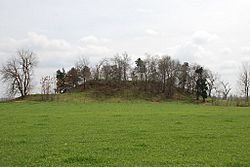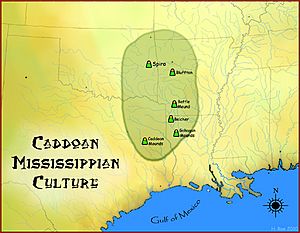Battle Mound Site facts for kids
 |
|
| Location | Lewisville, Lafayette County, Arkansas, |
|---|---|
| Region | Great Bend Region of the Red River |
| Coordinates | 33°17′56″N 93°40′24.5″W / 33.29889°N 93.673472°W |
| History | |
| Founded | 1200 CE |
| Abandoned | 1400 CE |
| Cultures | Caddoan Mississippian culture |
| Site notes | |
| Excavation dates | 1948 (unpublished) |
| Archaeologists | Dr. Alex D. Krieger, Duncan P. McKinnon |
| Architecture | |
| Architectural styles | Platform mound |
The Battle Mound Site (also known as 3LA1) is a very old place in Lafayette County, Arkansas. It is an archaeological site, which means it's a spot where scientists study how people lived long ago. This site is in the Great Bend area of the Red River.
The main part of the Battle Mound was built by people between the years 1200 CE and 1400 CE. That's about 800 to 600 years ago! This site has the biggest mound made by the Caddoan Mississippian culture. These were ancient people who lived in this part of North America.
Contents
Discover the Battle Mound Site
The Battle Mound is a huge, flat-topped hill made by ancient people. It is about 670 feet (204 meters) long. That's longer than two football fields! It is also about 320 feet (98 meters) wide, which is almost as wide as a football field. The mound stands about 34 feet (10 meters) tall, like a three-story building.
What Else Is at the Site?
Besides the main mound, there are four other smaller, low hills. Scientists believe these were also mounds built by the Caddoan people. Many old burial grounds and places where people lived might be connected to this important site.
Exploring the Past: Archaeological Work
People have been studying the Battle Mound Site for many years.
Early Investigations
In 1948, a scientist named Dr. Alex D. Krieger from the University of Texas at Austin led some early studies. His assistant, Mr. Lynn E. Howard, also helped. They worked at the site for a few months. Even though they did a lot of work, their notes and findings were never fully shared with the public.
Modern Research
More recently, another archaeologist named Duncan P. McKinnon has been doing new research at the site. He uses special tools that can "see" what's underground without digging. This helps scientists learn more about the mound and the people who built it without disturbing the ancient structures.
 | Delilah Pierce |
 | Gordon Parks |
 | Augusta Savage |
 | Charles Ethan Porter |


